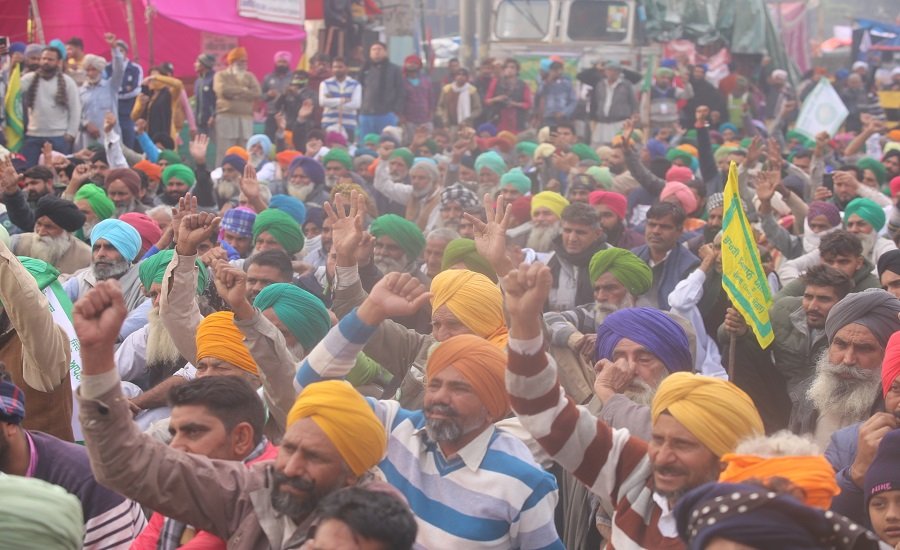
Chief Minister Amarinder Singh said it was high time the Central government realised its blunder and withdrew the legislations in the interest of the farmers and the nation.
CHANDIGARH — As the contentious farm laws passed by the Centre completed a year, Punjab Chief Minister Amarinder Singh on Friday demanded immediate scrapping of the legislations by the union government, calling for detailed discussions to find a way forward with the farmers, who have been on a mass protest since November 26 last year.
Pointing out that many farmers had died in these protests, the Chief Minister said it was high time the Central government realised its blunder and withdrew the legislations in the interest of the farmers and the nation.
The Chief Minister, wearing a #nofarmers_nofood bade, was inaugurating the third state-level virtual Kisan Mela organised by Punjab Agricultural University, Ludhiana.
The two-day mela is centered on the theme on eliminating stubble burning.
“Till date, the Indian constitution has been amended as many as 127 times, so why can it not be amended once again to scrap the farm laws and resolve the imbroglio resulting from them,” asked the Chief Minister.
“What is the problem in doing it a 128th time,” he demanded to know from the Bharatiya Janata Party (BJP)-led government at the Centre, which was out to ruin the farmers.
What was happening with the farmers today was extremely sad, given the immense contribution made by them to India’s development and progress, said Amarinder Singh, calling for immediate revocation of the laws, which he said were detrimental to the interest not just of the agricultural community but the entire country.
Recalling that he had been asked by the Centre to stop Punjab’s farmers from going to Delhi last November, the Chief Minister said he had refused point blank to do so, as protest is the democratic right of farmers.
“Why should they not protest? How can I stop them,” he asked, making it clear that he continues to stand with the farmers in their fight against the ‘draconian’ legislations, with his government continuing to give compensation and jobs to the families of the deceased farmers.
Noting the contribution of Punjab and its farmers to the country’s growth, the Chief Minister said the state, with only 1.53 per cent of total geographical area of India, produces about 18 per cent of the country’s wheat, 11 per cent paddy, 4.4 per cent cotton and 10 per cent milk.
For the past many decades, Punjab has been contributing about 35-40 per cent of wheat and 25-30 per cent of rice to the central pool, he said, expressing pride in the achievements of the state’s farmers.
The Chief Minister pointed out that the state had attained a record wheat productivity (5,188 kg per hectare) and production (182.6 lakh tons) during 2018-19. It also achieved a record rice productivity (4,366 kg per hectare) and production (133.8 lakh tons) during 2017-18.
Record cotton productivity (827 kg lint per hectare) was also achieved during 2019-20, he added, giving full credit for these achievements to the hardworking farmers of Punjab and the improved agricultural technologies developed by PAU.
The Chief Minister, who recalled that he had been attending Kisan Melas since 1970, stressed on the importance of agriculture as the lifeline of Punjab, and urged farmers to take full advantage of PAU’s advancements in technologies, seeds, etc.
He underlined the importance of continued research to keep pace with the developments in agriculture the world over. Citing Israel’s success in use of drip irrigation for judicious use of the fast-depleting water table, the Chief Minister said Punjab’s groundwater level had been continuously going down. The state’s diversification programme was linked to ensure minimal use of water, he added.
Inderjeet Singh, Vice Chancellor of Guru Angad Dev Veterinary and Animal Sciences University, Ludhiana, described the mela as an important platform to support farmers.
These Kisan Melas are a source of great information on latest advances in agriculture — on quality seed and planting material of improved varieties of various field, horticultural and vegetable crops is being made available to farmers from PAU campus as well as from outstations all over Punjab, he said. — IANS

